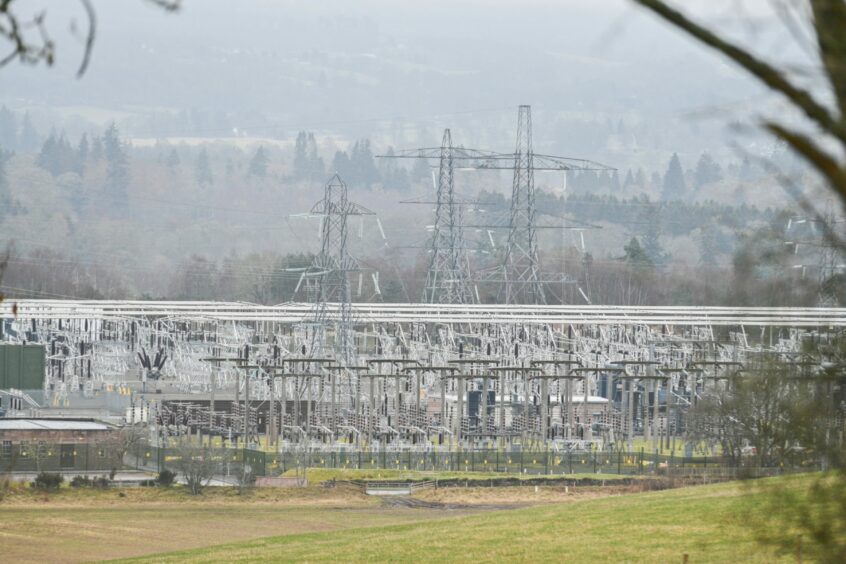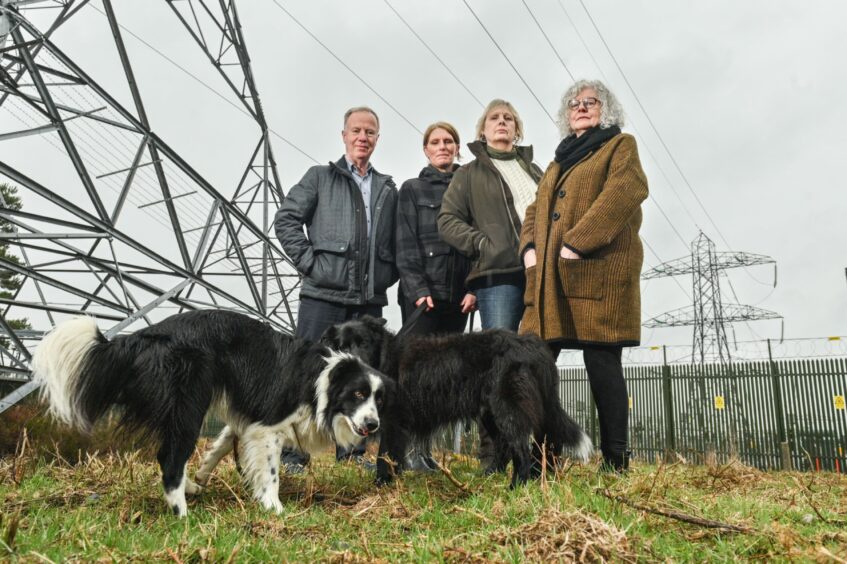Residents of small Highland community have voiced their concerns over the impact massive electricity pylons might have on their businesses.
Kirkhill and Bunchrew Community Council held a public meeting to discuss plans by SSEN to build 190 feet pylons through the area.
As part of SSEN’s expansion, three electricity lines will converge close to Beauly from the Western Isles, Spittal and Peterhead.
Many in the community strongly oppose the plans as they would spoil the area while offering no residential benefit due to the energy being exported to England.
Calum Kemp, who recently started his own charcuterie business, fears for his and his family’s future if the plans become reality.
His business called Moocdu, makes artisan cured meats and the family are currently building their family home and a business premises on a 28-acre piece of land near Newtonhill.
Having invested a lot of money into building and creating their forever home, Mr Kemp says there is no alternative for them, and are determined to fight.
He said: “It just seems crazy that this infrastructure can come right over our heads and there is absolutely no community benefit, it doesn’t seem fair.
‘It just seems unfair’
“As somebody with a young family, the health impacts don’t seem to be widely publicised, and this power line has three times the amount of energy going through it.
“We’ve got this beautiful landscape and it is an asset for our communities, for the people that live and grew up here and it’s scarring that landscape, it makes me very uncomfortable.
“I’ve put everything I’ve made and more from my life up till now into this business and this home in this area, that did not have massive electricity pylons going overhead. It just seems unfair.”
Jess Kemp added: “We decided to move up here to set up a life. We have a one-year-old and a six-year-old and they don’t have voices in this decision, we have to be the voice for our children.”
“It goes beyond this generation, it’s the future generation as well. We have got to stop it.”
Jess Kemp, local resident
Eamon Doorley, who attended the meeting, runs a music production business out of his home in Newtonhill “feels disenfranchised” about the plans for the power line to run very close to the home his family has had for 11 years.
He said: “One of the reasons we live where we are is because it’s quiet and we can work here without the inference from external sound pollution.
“The construction phase would be quite lengthy with heavy machinery working for months, even years.
Highland residents ‘completely against’ plans
“The huge noise generated by that alone would prevent you from working without considerable investment in soundproofing. You’d have to re-engineer your workspace and even then it’s not guaranteed.”
Several substations are planned along the route, with a huge 60-acre plant in Fanellon, just five miles from Mr Doorley’s property.
It would be larger than the current Balblair substation, which generates what’s known as the “Beauly Buzz”, which can be heard from four miles away.
Mr Doorley is hopeful the community can rally together and make their voices heard, saying that previously, residents had felt “voiceless”.
He added: “There is a strong possibility if this goes ahead, we will have to close or move our business out of the area, if that’s even possible given that the value of your own property will vastly be reduced due to the massive pylons next to you.
“Not only has it got the potential to close our business, but it’s also got the potential to leave us in debt.”
Speaking at the meeting was Lynsey Ward, part of Communities B4 Power Companies, a Beauly-based campaign group trying to stop the project.
She argues that residents and Scotland as a whole simply don’t need it and the project will create “an industrial hub for England”.
She asked the more than 60 people who attended the meeting if they “wanted the Highland to be sacrificed” to meet net-zero ambitions south of the border.
SSEN consulted on the plans for the Beauly area back in April which prompted the formation of the group to stop it.
Ms Ward says an SSEN representative noted during the April consultation that Beauly was “death by location” due to the three lines meeting comparing it to a “spaghetti junction”.
She also says residents’ homes built after 1991 were absent from maps illustrating the proposed route, leading some to believe SSEN used out-of-date maps with limited detail to mark the route.
‘We are all collateral damage’
However, SSEN told the P&J the maps they were using were from early 2022, but they were aware of missing details, with them being used for “illustrative purposes”.
Communities are now calling on the Highland Council to raise an objection, which would trigger a public inquiry.
A Highland Council spokesman said: “The SSEN Beauly to Peterhead 400kV line upgrade proposal will require consent from Scottish ministers under Section 37 of the Electricity Act 1989.
“Following submission of an application to ministers, the Highland Council will be consulted by ministers on the proposal and asked to provide its view on whether to object or not object. The council is not the determining authority.
“SSEN is currently at a pre-application stage in which it is considering line route options taking into account a range of views from stakeholders and communities.
“While council officers are aware of the options, we have not had a formal pre-application discussion on the route.
SSEN told the P&J plans were still in the “early stages of development” and they were actively looking at rerouting the line in “areas of particular local sensitivity”.
An SSEN spokeswoman said: “As a stakeholder-led business, we are committed to meaningful and constructive engagement with all stakeholders throughout the development process, and we are actively seeking their input and feedback to help inform the design of potential overhead line route and substation options.
“Where there may be a requirement for us to purchase land for our infrastructure, every attempt will be made to reach agreement on a voluntary basis and it is only as an absolute last resort when all other options have been exhausted, will we consider using our statutory compulsory purchase order powers.”





